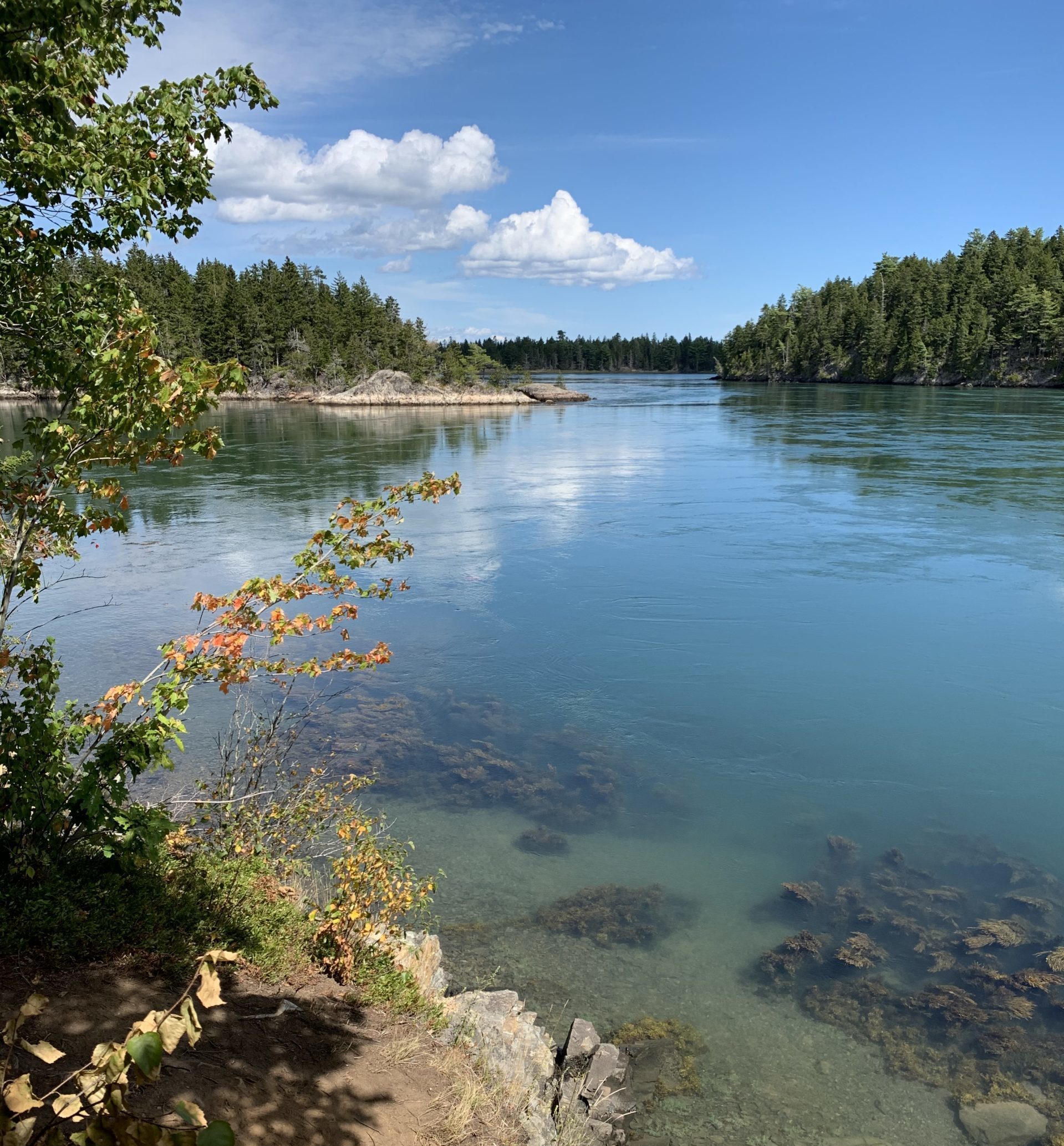Reflections on the path forward, from Severine von Tscharner Fleming, a farmer, activist, and organizer who runs Smithereen Farm, an organic wild blueberry, seaweed, and orchard operation at the edge of Cobscook Bay, Maine, that’s certified by the Maine Organic Farmers and Gardeners Association and hosts summer camps, camping, and educational workshops.
A bit about our situation—Cobscook Bay lies in Downeasternmost Maine, right up at the Canadian border, a huge multilobed bay with six rivers flowing into it, and a rare refugium on the highly developed Atlantic coastline. Here, we are hosts to migrating right whales and the last runs of Atlantic salmon, huge runs of herring and mackerel, puffins, porpoises, seals, eagles, herons, osprey, guillemots, and cormorants, and we’re a stopover for shorebirds traveling thousands of miles on their global migration. Powered by massive 22-foot tides and vibrant forests of seaweed, a cold current down from Labrador, and the upwelling created by the Gulf Stream, this is a region of globally significant marine and wildlife productivity.
The area represents a unique opportunity for restoration, and in acknowledgment, millions of federal, state, and private dollars have been spent improving fish passage, building fish ladders, highway bridges, and culverts. And the response of the fish has been remarkable, as with the Penobscot River, where runs of sturgeon and shad have bounced back. Our St. Croix River used to host more alewives, an estimated 30 million per year, than the rest of the rivers of Maine combined—now that the dams have been removed, this river, too, is on the way to recovery.
A company called Wolfden Resources, backed by Kinross and wildcat speculators, has announced plans to develop a 60-mile-long silver vein, about two miles from the center of our town and from the heart of Cobscook Bay. The proposed undertaking, while vastly larger than the Callahan mine in nearby Brooksville, has characteristics that are similar to Callahan, a mere 120-acre property that nevertheless generated 1.7 million cubic yards of waste rock and a tailings impoundment with a 21-acre footprint, all cheek by jowl with a wildlife sanctuary and ecologically sensitive coastal waterways. Although the mining operation is long gone, Callahan today is an Environmental Protection Agency Superfund site, with extensive and ruinous soil and groundwater contamination that the state of Maine and the federal government have been struggling for decades to clean up, at an estimated cost in excess of $750,000 per year.
We, along with other young farmers, have found the rural community of Cobscook Bay a suitable habitat for organic agriculture and have built up an educational campus, publishing our New Farmer’s Almanac from our own research library and producing online media from a set of historic buildings. We have set up an artists’ residency, summer camp program, and eco-tourism business in a long-abandoned motel that happens to own the dam across the Pennamaquan River, where three of the four streams in the proposed mine site would drain, and where all the young children from our town go to swim in the summer. Now a company from Canada wants to poison it all.
we must stop them
We realize that all of us who Zoom, fly, or telecommute are implicated in metallurgy and therefore in mining—and, indeed, that most of the costs and environmental consequences of these digital tools are borne by small villagers in developing countries where international mining companies operate with impunity.
But now, given the policy environment created by the “green energy push” and a wish to “reignite” domestic manufacturing and energy independence, mining for lithium and other metals have a kind of sanction, and our own state geologist and geological survey are conducting test flights and facilitating speculation. Rural areas like ours are very vulnerable to mining companies funded by the massive pile-up of private equity looking for a hedge, a durable asset, and most particularly, for metals. We, like so many others in our national network of young farmers, must now learn to navigate the regulatory process to confront this mine.
Most of the people I’ve met and learned from in the mine fight are in their seventies and eighties: these former legislators, lawyers, and longtime community organizers have put in the time and hours and testimony. But still, our industry-friendly regulatory process leaves us vulnerable—we need another generation and a huge pulse of mobilization in order to convince our governor, our Department of Environmental Protection, our representatives to take seriously the plain evidence of acid mine drainage to our groundwater, aquifers, rivers, and coastal fisheries. Mines of marginal quality in wet environments like Maine may not make sense, but they will exist somewhere, and everywhere they exist we will need to mobilize to better ensure responsible practices.
If we acknowledge our complicity, will more of us wake up to the need or orient ourselves to the healing, to a restoration economy, and to the long, unglamorous work of regulating industry? As we confront these global players poised to contaminate our home watershed, I hope that our small cultural organization can make a difference by bringing this story about resource extraction to a network we have built in celebration of agro-ecology, rural resilience, and to the restoration of agrarian self-determination. As we come to value farmland, farming, and the work of stewardship, we can extend that care to all the land impacted by our modern lives, and get involved.
We have created a site, www.stopbigsilver.org, for more information, to get involved, and to welcome visitors who might be motivated to help us resist the expansion of high-sulfur polymetallic mining here in Maine.







0 Comments